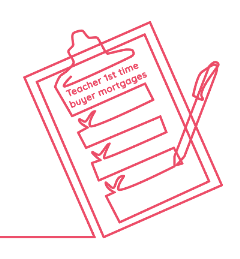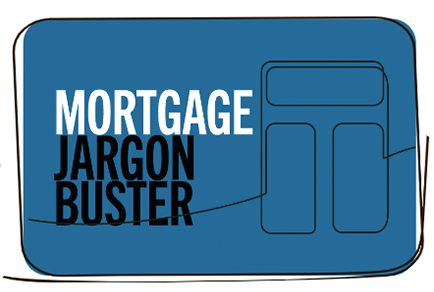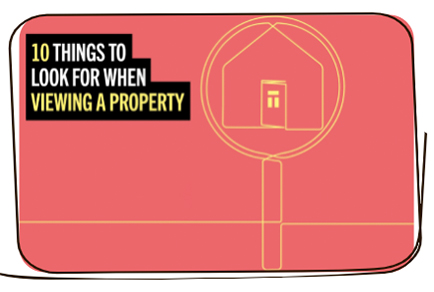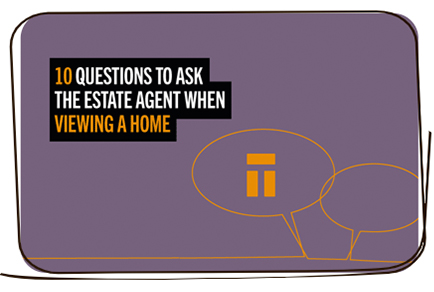Have you ever wondered where to start when it comes to buying a home of your own?
For the first time buyer we know it can feel daunting and want to help simplify things. In this guide we explain in ten simple steps how to progress from prospective buyer to home owner.
1. Save a deposit (& a bit extra)
You’ll need to save up at least 5% of the value of the property you want to buy to use as a deposit. How much is 5%? If you’re not sure what value of property you might be able to buy you can use our mortgage affordability calculator to get a rough idea based on your income, then aim to save a minimum 5% of the value. It is worth saving a little extra for a few reasons -
Firstly, you’ll need enough savings to cover other costs associated with buying a home, including legal costs, mortgage fees (the cost of applying for and securing a mortgage), potentially stamp duty (a tax on properties that’s applicable for first time purchases above £425k), potentially a moving company (if needed), and some cash to buy essential fixtures, fittings and furniture.
Secondly, having a large deposit generally means better (lower) mortgage interest rates, so saving more (if you can) is a bonus. Assuming you have a 5% deposit you’ll need to look at mortgages for up to 95% Loan to Value (LTV) which means you are borrowing 95% of the cost of the house, plus your 5% deposit = 100% cost of the property. As a general rule, the lower the LTV (and the higher the deposit) the lower the mortgage rates are that will determine your monthly repayments.

2. Find out how much you can afford to buy a home
Knowing how much you can borrow is important before you start ‘shopping’ for a home. A mortgage affordability calculator will help with this. If you’ve already got your deposit saved up and are ready to start the process, talk to a mortgage expert to confirm your affordability (how much you can borrow – this might have changed thanks to pay rises whilst you’ve been saving) and get a Decision in Principle (an official estimate of the amount you can borrow). It can be done quickly and simply over the phone in 10-15 minutes. This means you can house hunt with the confidence that you’ve got the amount you can spend correct.
To get a Decision in Principle (DIP) our mortgage advisor will ask you about your income (don’t worry if you’ve yet to start your first teaching post) and your outgoings. If you’re buying jointly with someone else (only one of you needs to be a teacher) they’ll ask about their income and outgoings too. Then they’ll calculate how much you can borrow, and combined with your deposit what the total price is you can spend on a home.
3. Find a home and make an offer
Once you have a deposit and a DIP you’re ready to start the exciting part - hunting for a home! There are lots of home buying websites that will show you what’s on the market for your budget but you’ll need to visit some in person – do this by arranging an appointment with the estate agent. As well as the obvious points about whether it meets your needs, is in budget and you actually like it enough to buy it, think about some of the practical elements when viewing.
Remember you can go back for a second look if you need to. If you like the home, asking the estate agent some questions will help you decide how much to offer. For example:
- Does the property require any updates that could be costly?
- Is there any damp?
- Are the roof, windows and doors in good condition?
- How old is the boiler? When was it last serviced?
- Which direction does the property face?
- Is there adequate parking for your needs?
- What exactly is included/excluded from the sale?
- Are the rooms big enough and is there enough storage space?
- Are there sufficient plug points, do they look in good condition?
- Does the fuse board indicate the state of the electrics?
- Is the plumbing up to scratch? (try the taps to test water pressure)
- Has there been a previous survey on the property?
- Why are the current owners selling?
- How long has the property been on the market and how much interest has it had?
- Have the current owners already found somewhere else to go?
- Who set the asking price?
- Have there been any previous offers on the property?
- Will the seller remove the property from the market for a good offer?
- Other than price are there factors which are important to the seller in deciding who to sell to?
- Is it freehold or leasehold?
- Who are the neighbours/ have there been any issues?

4. Make a full mortgage application
Next you need to make an appointment for a full mortgage application, where you are formally requesting a mortgage in relation to a specific property. These appointments typically last around 90 minutes – at Teachers we can make appointments available for you to fit round the school day.
To prepare for the appointment, gather together details of your income, outgoings (specifics) and the property you want to purchase. Our budget planner form will ensure you haven’t forgotten any expenses. At this stage you’ll go into more detail about the specific mortgage you will take (whether you want a fixed or variable rate), how much it will cost you per month and how much it will cost to repay in full. The advisor will also check that all the financial facts you told them about yourself are correct.
As part of the mortgage application, we will complete a survey on the property – to check it’s worth what you’ve offered to pay. Once the we are happy with all the information about you and the property, they’ll make you an official mortgage offer which you’ll need to formally accept.
5. Get professional support
As well as arranging a mortgage, you’ll need the help of some other professionals to complete the home buying process, most notably legal support (sometimes called conveyancing).You’ll need to appoint a solicitor to control the purchase of your home. They’ll handle all legal elements of the sale which includes completing (on your behalf, and with a cost associated) checks on the property and local area. They’ll notify you of anything unusual they find. If they flag anything you don’t understand, just ask – there will be a fair amount of paperwork but it’s important to read through and ask questions now to avoid surprises later.
Solicitors fees vary so get a few quotes – ask family, friends and colleagues for recommendations. As well as their own charges, you’ll need to pay them for any checks they do on your home that come at a cost (for example via the local council) – they’ll be able to supply you a list of all the items and costs. At this stage you might also want to engage a surveyor of your own to check the property is structurally sound and flag any potential issues that might cost you money to put right. The type of property you are buying will help you decide which survey you need.

6. Agree a completion date
Once all the legal and financial works are in hand, you’ll be asked to agree a completion date – this means the date you take over becoming the owner of the home. Whilst you’re a first time buyer, there could be a long property chain above you (of people selling one home and buying the next) and everyone needs to agree a single date to move out/move in. Finalise your removal support at this stage!
7. Insurance
You’ll need home insurance (both buildings and contents) to complete the purchase and your solicitor will ask for proof of this, so line this up now (yes, before you’ve purchased it). Once you’ve exchanged contracts you are legally bound to make the purchase so get good quality cover sorted now for both your home and the valuables you’ll keep there
8. Exchange contracts
Exchanging of contracts is an important legal step in the home buying process – it is also a firm commitment (legally binding) to go through with the purchase. A few things have to happen for exchange to take place:
- Firstly you will need to have agreed a date for completion. This is usually 7-28 days after exchange, but can happen on the same day.
- Secondly, you’ll be asked to pay the ‘deposit’ (5% or more) to the solicitor ready for them to pay the seller (your solicitor will pay the funds to the seller’s solicitor who will hold them until completion).Your solicitor will also ask you to sign all the necessary paperwork at this point.
9. Preparing for ownership
Once exchange has taken place you are legally bound to complete the purchase. You now need to:
- Finalise any removal arrangements – this might be packing a few personal belongings or arranging a specialist firm if you have more furniture.
- Make a list of any providers/services/contacts you’ll need to advise of your move and new address.
- Arrange any initial services you might need in your new home – TV/phone/internet connection; white goods delivery.
In between exchange and completion, your solicitor will notify us of the completion date on your behalf and request the mortgage funds, which are usually sent to the solicitor a couple of days in advance.
10. Completion
At this point not only does the solicitor pay the seller of the home on your behalf, they’ll also pay the stamp duty (if any is due). Another important job is officially registering your ownership of the property with the Land Registry. Your solicitor will also do this for you. Now you can pull down the ‘sold’ sign, start making memories...and start paying back the mortgage!
More mortgage guides you may find helpful...

Mortgage jargon buster guide
We try not to use industry jargon when we’re talking about mortgages, but some terms and phrases just can’t be replaced. In this simple guide we simply explain the lingo you’re most likely to encounter.

10 things to look at when viewing a property
Viewing a potential home for purchase is really exciting, but whilst a “good feeling” is important, it’s also worth considering more practical aspects whilst looking around. In this short guide we share 10 things to look at when viewing a property you’re considering purchasing.

10 questions to ask an estate agent
It's common when viewing a potential property that an estate agent shows you round and tells you some basic information about the home. But as industry experts is there extra information they have that would be useful to you in the decision making process? In this guide we reveal 10 things you could consider asking to leave you armed with as much information as possible.
